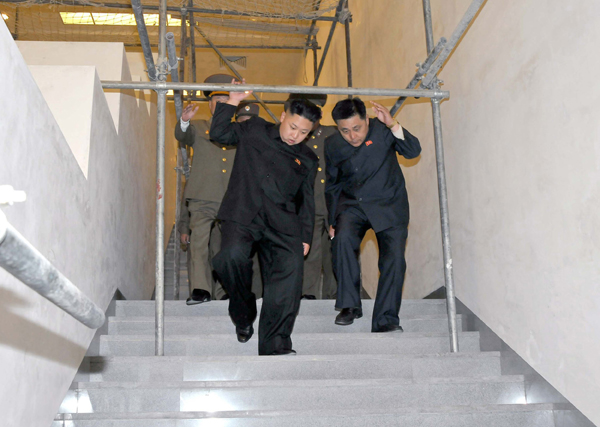DPRK moves medium-range missiles
|
 This undated picture, released by the Korean Central News Agency on Tuesday, shows Democratic People's Republic of Korea leader Kim Jong-un inspecting the Victorious Fatherland Liberation War Museum under construction in Pyongyang. KCNA via KNS via Agence France-Presse |
The Democratic People's Republic of Korea has taken two Musudan missiles off launch-ready status and moved them from the country's east coast, US officials told Reuters on Monday, after weeks of concern that Pyongyang was poised for a test launch.
US Secretary of State John Kerry warned the DPRK last month that it would be a "huge mistake" to fire the medium-range missiles. The prospects of a test had put Seoul, Washington and Tokyo on edge after Pyongyang threatened to attack the Republic of Korea and the United States.
The move to shift the missiles follows a reduction in rhetoric from Pyongyang.
One US official, speaking on condition of anonymity, said the missiles were still mobile and the fact they had been moved was no guarantee they would not be set up elsewhere and fired at some point.
Another US official - Daniel Russel, senior director for Asian affairs at the National Security Council - agreed, saying, "It is premature to celebrate it as good news."
However, a third US official, also speaking on condition of anonymity, said the US did not believe the missiles had gone to an alternate launch site and that they are now believed to be in a non-operational location.
The Musudan missiles have a range of 3,000 to 3,500 kilometers. They have not been tested before.
In Seoul, the ROK's Defense Ministry declined to confirm any movement of the missiles, saying it is still tracking the DPRK's missile activities, and indicating it has yet to conclude Pyongyang has shelved plans for a launch from its east coast.
Heightened tensions
Pentagon spokesman George Little declined to comment on the status of the DPRK missiles.
"I wouldn't again comment on intelligence. But what we have seen recently is a provocation pause. And we think that's obviously beneficial to efforts to ensure we have peace and stability on the Korean Peninsula," Little told reporters.
The heightened tensions, including DPRK threats to attack US bases in the Pacific, coincided with US-ROK military drills that Pyongyang had branded "a rehearsal for invasion". Those drills ended on April 30.
In a rare show of force during the drills, two nuclear-capable, bat-winged B-2 stealth bombers flew more than 37 hours from their US base to drop dummy munitions on an ROK range, and then returned home.
Asked what may have contributed to Pyongyang's latest move, Little noted various possibilities, including the fact that the DPRK's previous cycles of provocation had ended after a period of time. He also noted that the Chinese government has made some helpful statements.
"We have said we'd be able to speak publicly when the North has completely withdrawn" the missiles, ROK Defense Ministry spokesman Kim Min-seok said. The DPRK warned on Tuesday that it will "mercilessly avenge" any breach of its territorial sovereignty by the ROK or the US during their ongoing anti-submarine drills in the Yellow Sea.
The Southwestern Front Command of the Korean People's Army said all units and sub-units of the military in the region will simultaneously start military actions in accordance with operation plans ratified by the supreme command, the official news agency KCNA said.
'Mercilessly avenge'
It warned that if the ROK or the US responds "recklessly" to the DPRK's counteractions, prompt actions by rocket forces deployed in the southwestern sector will turn the five islands in the Yellow Sea into a "sea of flames".
The ROK and the US launched a five-day joint naval military drill on Monday in the Yellow Sea with the participation of a nuclear-powered Los Angeles-class submarine.
The anti-submarine regular exercises, which came in the wake of the two-month-long joint Foal Eagle military exercise, also involves Aegis destroyers and P-3C maritime surveillance aircraft deployed from US bases.
The DPRK said on Sunday that if Seoul really worries about the future of the Kaesong Industrial Complex, it should stop all its hostile policy and provocative military drills toward Pyongyang.
However, a ROK Defense Ministry spokesman brushed off the warnings, saying that "as long as the combined forces and South Korean military exist, the drills will continue".
The DPRK was expected to be discussed at a meeting between US President Barack Obama and ROK President Park Guen-hye at the White House on Tuesday, where they were scheduled to have a working lunch followed by a joint news conference.
The DPRK has also remained in the spotlight after it sentenced a Korean-American who visited the country in November to 15 years hard labor for what it said were crimes against the state.
Human rights activists in the ROK say Kenneth Bae may have been arrested for taking pictures of starving children. A US official said last week Washington was not looking for an envoy to try to secure the release of Bae, who was sentenced last week.
Reuters-Xinhua


















